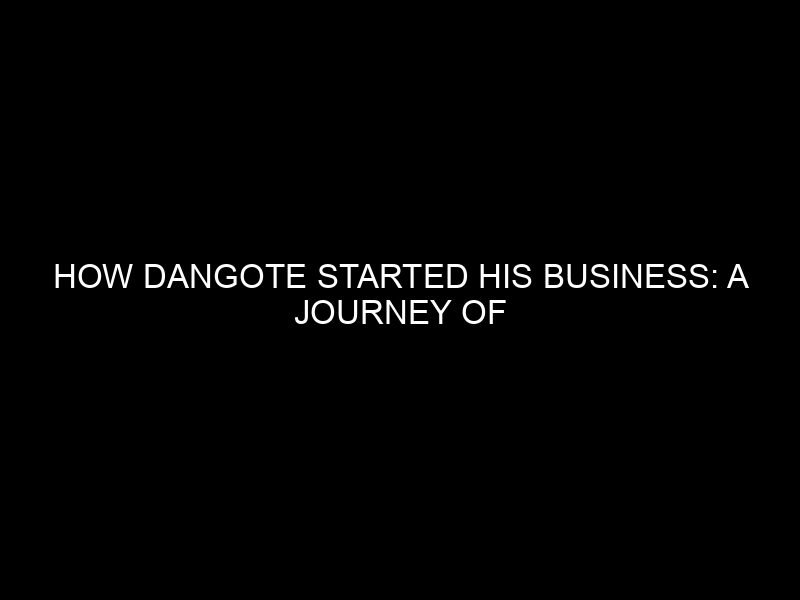Nigeria, a land rich in culture and resources, has been the birthplace of many successful entrepreneurs. Among them, Aliko Dangote stands out as a beacon of African business success. As someone with a background in Nigeria business and an understanding of the Dangote Group’s operations, I am well-placed to explore the inception of Aliko Dangote’s business empire.
Aliko Dangote, Africa’s richest man, began his journey in the business world with a vision and determination. This article aims to delve into the foundational years of his business, exploring the initial investment and strategies that propelled Dangote Group to its current status as a multinational conglomerate.
The Genesis of Dangote’s Business Empire
Aliko Dangote’s business journey began in 1977 with the establishment of Dangote Group. The initial focus of the group was on trading in commodities like cement, sugar, and flour. But how much did Dangote use to start this business? The answer lies in a combination of personal savings and a loan.
Dangote, born into a wealthy family, had the advantage of financial support. He received a loan of 500,000 Naira from his uncle, Sanusi Dantata. This amount, equivalent to around $2,500 at the time, was a substantial sum in Nigeria in the late 1970s. This loan, combined with his own savings and a deep understanding of the Nigerian market, provided the initial capital for his venture.
Strategic Business Decisions and Growth
The decision to start with commodities trading was a strategic one. Dangote identified a gap in the market and leveraged his understanding of the Nigerian economy to fill it. He focused on importing goods that were in high demand and underserved by existing suppliers. This approach not only ensured a quick turnover but also helped him build a network of suppliers and customers that would be crucial for future expansion.
His business acumen quickly led to the expansion of his enterprise. By reinvesting profits and carefully managing his resources, Dangote was able to diversify into manufacturing. This diversification was a significant step as it moved the company from being a trading entity to a producer, thus adding more value within the Nigerian economy.
Dangote Group’s Diversification and Innovation
The transition from trading to manufacturing marked a new era for the Dangote Group. The company ventured into cement manufacturing, a sector that would become its flagship. The establishment of the Dangote Cement factory not only demonstrated Dangote’s innovative approach but also his commitment to contributing to Nigeria’s development. By producing cement locally, Dangote Group helped reduce Nigeria’s dependence on imports, which was a significant step towards economic self-sufficiency.
Furthermore, Dangote Group’s diversification didn’t stop at cement. The company expanded into other areas, including sugar refining, salt processing, and flour milling. Each of these sectors was chosen for their potential to contribute to Nigeria’s economy and for the opportunity they presented for import substitution.
Impact on the Nigerian Economy
Dangote’s business ventures have had a profound impact on the Nigerian economy. By focusing on sectors critical to the country’s development, Dangote Group has played a significant role in job creation, skill development, and industrialization. The group’s commitment to investing in local production has also helped reduce Nigeria’s reliance on imports, thereby conserving foreign exchange.
Moreover, Dangote’s success has been a source of inspiration for many Nigerian entrepreneurs. His journey from a loan of 500,000 Naira to leading one of Africa’s largest conglomerates is a testament to the potential that lies within the African continent.
Frequently Asked Questions
Q: What was the initial investment of Aliko Dangote in his business? A: Aliko Dangote started his business with a loan of 500,000 Naira from his uncle, combined with his personal savings.
Q: Why did Dangote choose commodities trading as his initial business venture? A: Dangote identified a market gap in commodities trading, particularly in items that were in high demand but underserved. This strategic decision allowed for quick turnover and market penetration.
Q: How has Dangote Group impacted the Nigerian economy? A: The Dangote Group has significantly impacted the Nigerian economy through job creation, skill development, industrialization, and reducing dependence on imports.
Q: What sectors does the Dangote Group operate in? A: The Dangote Group has diversified into several sectors, including cement manufacturing, sugar refining, salt processing, and flour milling.

Leave a Reply